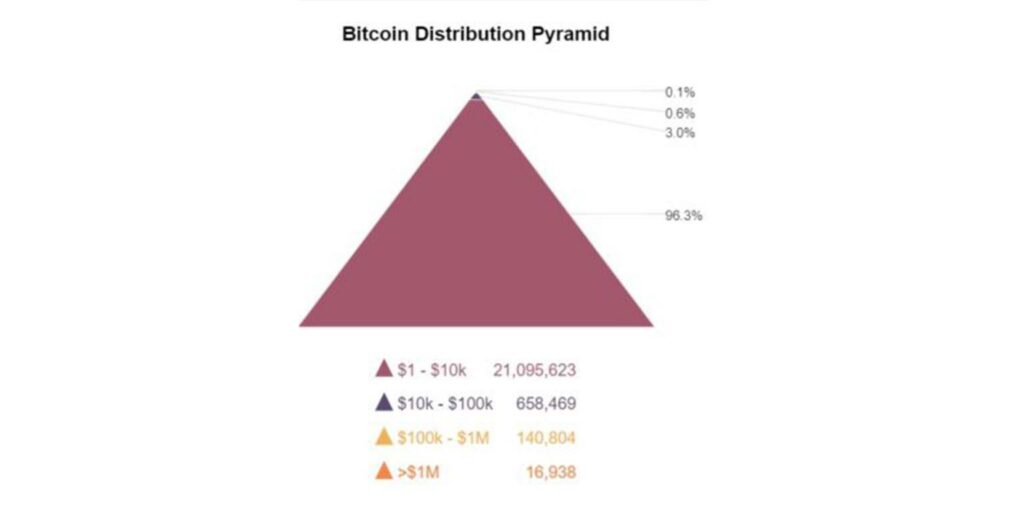Most cryptocurrencies are owned by a handful of large investors. These whales do have a large percentage of crypto assets in circulation, and as a result, their decisions can have a significant impact on prices and affect the market.
The real distribution of wealth in the cryptocurrency sector
Today we want to tell you how many addresses and wallets contain most of the Bitcoins, ethers, XRP and litecoins in circulation. We will also explain why it is very difficult to get a concrete idea of the distribution of digital currencies.
Before you start, keep in mind that one individual or legal entity may have multiple wallets, so the data presented in this article will still not be able to reflect the true reality. Thus, the distribution may be even more uneven than one might think.
Bitcoin: 10 addresses contain 5% of coins
According to data provided by Bitinfocharts, the top 10 bitcoin addresses represent 5.37% of the BTC in circulation. The 1000 richest addresses own 35.08% of the coins.

A graph developed by Bitcoinist in 2018 gives a General idea of the distribution of BTC. Obviously, the ratios have changed a bit since then. Not surprisingly, the top 10 richest addresses include several crypto exchanges.
Please note that the Bitcoins contained in the platform address belong (usually) to its users. Therefore, the exchange does not store cryptocurrencies on its own account.
In any case, it is the cold wallet of the Huobi exchange that tops the rating. The platform from Singapore is very popular in Asian countries. At the time of writing, the address contained 255,502 bitcoins, which is more than $ 2 billion, and 1.39% of the coins on the market.
In the second position, we see the BitStamp exchange, with 101.857 BTC, or 0.5543% of the mined coins.
Third place is taken by Another huobi wallet – 94,506 BTC, or 0.5143% of the currency.
The fourth address belongs to the Bitfinex crypto exchange. It contains 90,001 BTC, or 0.4898% of all the bitcoins on the market.
Finally, the fifth largest address belongs to Binance – 88,990 BTC, 0.4843%.
Kraken or Bittrex are next.
As you can see, the largest crypto wallets are public addresses of exchanges. There are also many inactive wallets in the top 10 or top 20. They belong to mysterious whales or long-term holders, and have never sent BTC to other wallets.
But do not forget about such categories of holders as technical enthusiasts, analysts, lucky people, companies or government agencies. They all have one thing in common: they have a well-stocked bitcoin wallet.
- Charlie Shrem is perhaps one of the most controversial bitcoin millionaires. He invested quite a lot of money, buying a large amount of BTC at the dawn of the cryptocurrency. Shrem was also an active member of the Bitcoin Foundation and founded BitInstant at the age of 22. Although he did not disclose exactly how many bits he has, he allegedly bought “several thousand” at the beginning of their appearance.
- Barry Silbert is the founder of Digital Currency Group, a venture capital firm specializing in the digital currency market. He bought 48,000 PTS at an auction organized by the US government in 2014. At that time, the cost of one BTC was about $ 350.
- Roger Ver is a libertarian. Unlike other billionaires who spend their money buying private Islands or luxury planes, Roger Ver dreams of creating his own libertarian nation, where everyone is free to do exactly what they want with their own person, or with their own private property. He owns at least 100,000 coins.
- Garvin Andresen is considered the person who made this digital currency what it is today. Garvin is one of those believed to be behind the pseudonym Satoshi Nakamoto, which he constantly denies. According to some sources, he has just over 100,000 BTC.
- The Winklevoss twins spent $ 11 million (out of $ 65 million) to invest in this digital currency. In 2013, they owned 1% of all BTC in circulation, or about 115,000 units.
- The FBI seized the Silk Road website, a marketplace that hosted illegal activity on the Dark Web, and confiscated 144,000 BTC belonging to the site’s owner, Ross Ulbricht. If we add up all the seizures made by the FBI, it will put this state organization on the podium of the largest holders of BTC.
- Bulgaria is the custodian of bitcoin assets. As a result of an investigation conducted by law enforcement agencies in 2017, 213,519 PTS were seized, which is enough to pay off a quarter of the country’s public debt.
- Satoshi Nakamoto remains the main holder of the coin. There are about 1.1 million of them, and if he sold his entire wallet, the price of Bitcoin could drop in an instant, and he could establish himself in the Pantheon of the world’s greatest fortunes.
We can add that the 1000 wallets with the largest number of Bitcoins will contain about 35% of the total amount of BTC in circulation.
Ethereum (ETH): 100 addresses contain 26% of coins
A survey by Adam Cochran, an investor and analyst, shows that the 10 richest ETH addresses contain 16.6 million Ethers, or 17% of the currencies in circulation.
According to the EtherScan website, the most frequently provided address belongs to the Bitfinex exchange (3698633 ETH, or 3.33% of the number of coins currently in circulation).
In second place is the Huobi platform (3,125,760 ETH, 2.81% of the market), followed by Binance (2,507,764 or 2.26%) and Wrapped Ether (2,294,799 or 2%).
percentage of ethers in the 10,000 most filled portfolios without smart contract addresses
Unlike other cryptocurrencies, ETH relies on smart contracts. The currencies deposited under these contracts distort the distribution figures. After the currencies locked in smart contracts are removed from the equation, we will realize that the 1000 most important ETH addresses contain only 42.5 million ETH, or 42.5% of assets.
The 100 richest addresses accumulate 26.4% of the ether. As with the BTC, a significant portion of the currency is in the hands of exchanges and holders.
Finally, it should be noted that 9% of Ethereum is declared unavailable on cold wallets whose owners have lost access. The actual amount of currency lost is probably higher.
Ripple (XRP): the coins are mostly owned by its creators
Unlike the other cryptocurrencies mentioned in this article, the entire Ripple has already been created, i.e. 100 billion XRP coins. However, there are still only 44 billion coins in circulation today.
Ripple, the company behind the payment Protocol and the XRP cryptocurrency, is delivering new coins held in escrow at a rate of 1 billion XRP per month.
As such, Ripple currently still holds most of its assets in escrow. Not surprisingly, the founders of Ripple are among the largest holders of XRP. So, Chris Larsen, co-founder and former CEO of Ripple, owns 5.1 billion XRP, according to Forbes.
In turn, jed McCaleb, co-founder of Ripple and Stellar Lumens, owns more than 5.3 billion XRP. In April, he got rid of 54 million coins.He claims to regularly sell his XRP for dollars.
In particular, the 100 largest accounts account for 70.39% of XRP currently in circulation, Ledger Exposed shows. Taking into account the XRP placed on ripple’s escrow, only 35.60% of the coins belong to the 100 richest addresses.
Litecoin (LTC): the 10 richest addresses own 11% of the crypto asset
As we can read on Bitinfocharts, the 10 richest Litecoin holders hold 11% of the coins in circulation. The active address is 1 644 400 LTC, or 2,53% of the market. The second one contains more than 2.50% of the total number of coins, or 1.626028 LTC. It is not known who the other addresses belong to. These are probably the wallets of exchange platforms.
It should be noted that wealth seems to be much more concentrated in the Litecoin market than in the Bitcoin market, where the 10 main addresses contain only 5% of the tokens.
Bitcoin Cash (BCH): almost 10% of crypto assets are stored in 10 wallets
However, according to Bitinfocharts, the 10 richest Bitcoin Cash addresses own almost 10% of the available BCH. Thus, we find a ratio similar to Litecoin.
At the moment the most frequently used address contains 505 295 BCH, or 2.75% of coins in circulation. The second largest is 277,616 BCH, or 1.51% of the market.
Conclusion
To sum up, we can safely say that the holdings of only 189 accounts make up 50% of the LTC in circulation.
Thus, Litecoin is important as a cryptocurrency where wealth inequality is most obvious. It is more vulnerable to whale decisions than Bitcoin, Bitcoin Cash, and Ethereum.
As a result, the price of LTC is more dependent on whales ‘ decisions than the price of Bitcoin, Bitcoin Cash, or Ethereum, whose inequality has nevertheless increased dramatically since 2018.
The lower liquidity and higher volatility of cryptocurrency markets means that whales can create a lot of resonance. Some investors trade currencies in such large quantities that they affect the value of the crypt itself, which undermines the decentralized principles on which blockchains and cryptocurrencies are based.
In fact, it is often impossible to find out who is behind most anonymous addresses. In addition, the percentages displayed by sites such as Bitinfocharts usually do not take into account the number of tokens or coins lost in nature that are not available to holders. Finally, keep in mind that many investors store their assets directly on the exchange, rather than in a special wallet. So it is difficult, if not impossible, to get a real picture of the distribution of wealth in the crypto sector.


